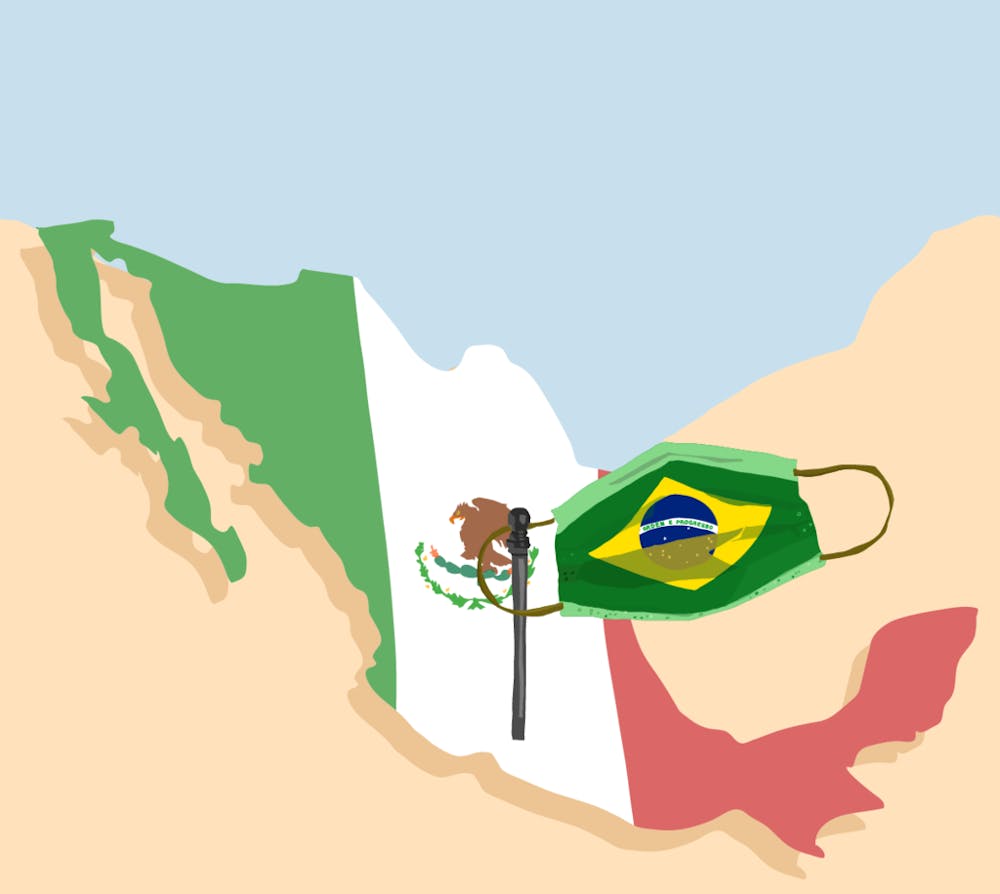
International students from Brazil have been quarantining in Mexico for two weeks in order to gain entry to the United States and arrive on campus.
Proclamations issued by the Trump administration last year have restricted the entry of certain travelers — particularly those from Brazil, Iran, China, the United Kingdom, the Republic of Ireland, and the European Schengen area — into the United States in efforts to curb the spread of COVID-19.
Former President and 1968 Wharton graduate Donald Trump signed a proclamation on May 27 suspending foreign nationals who had been present in Brazil 14 days prior to arriving in the United States from entering the country, and a similar travel restriction earlier this year for all foreign nationals who had been present in European states 14 days prior to arriving in the United States. Unlike the suspension for people coming from Brazil, this proclamation included an exemption for F-1 visas used by international students.
With few countries currently allowing people to enter the United States from Brazil, many international students who spent winter break in Brazil this year were faced with a dilemma: stay in Brazil until restrictions lift, or quarantine elsewhere in order to eventually reach Penn's campus for the spring?
A group of international students ultimately decided to quarantine in Mexico for 14 days in order to be granted entry into the United States this semester.
College junior Renan Muta, who arrived in the United States on Jan. 23, said that his only options of countries in which to quarantine were Panama, Dubai, and Mexico. He chose Mexico due to its proximity to Brazil, and because Mexico does not require Brazilians to acquire a visa.
Upon arrival, Muta said he was surprised to find that Mexico had imposed very few COVID-19 safety regulations, adding that most businesses were open and masks were not required.
"This is one of the reasons that I don't understand why this policy is needed. With so few safety regulations, the risk of getting the virus is not much lower in Mexico than it is in Brazil," Muta said, arguing that the policy seemed arbitrary.
Like Muta, Wharton and College senior Julia Gros, who is currently quarantining in Mexico with a group of Penn students and other Brazilians who attend college in the United States, believes that the U.S. travel restrictions are frustrating. She said she does not understand why international students from Brazil were not granted an exemption so that they could bypass the travel ban.
While the Trump administration announced that restrictions on Brazil would lift on Jan. 26 as long as travelers presented a negative COVID-19 test taken in the past 72 hours, the Biden administration announced on Jan. 25 that the ban on people coming in from Brazil would be immediately reinstated due to the worsening "pandemic and more contagious variants emerging across the world."
Gros and Muta agreed that it was difficult for some Brazilian students to spend the extra money that was required in order to stay in Mexico for two weeks.
"The quarantine is an issue because it forces Brazilian students to spend a lot of extra money and time just to get back into the [United States]," Gros said. "One of the reasons I didn't come back in the fall was that I didn't want to quarantine [in another country] for two weeks in August [before arriving in the United States]."
Gros said she had no other option but to come back to the United States for the spring semester because she needs to be in the country before March in order to apply for her Optional Practical Training — the visa which allows international students to work for one to three years immediately after graduation.
Engineering and Wharton sophomore Rafael Marques also arrived at Penn on Jan. 23 after quarantining in Mexico with Muta and one other Penn student.
Marques and Muta explained that in order to arrive in the United States before the start of classes, they would have had to leave their families soon after the New Year. Reluctant to do so, both students stayed longer in Brazil and then had to begin the semester while quarantining in Mexico.
Marques said that the most frustrating aspect of the United States travel bans is the feeling of uncertainty they cause students, adding that many international students in Brazil delayed their return to Philadelphia as they waited until the date Trump would lift the restrictions, hoping that Biden would not reimpose them.
While in Mexico, Marques said he was worried that the United States would impose travel restrictions on Mexico during his quarantine period, which would have forced him to find another country in which to quarantine to be granted entry to the United States.
"I was thinking that they might close Mexico at any moment so I wanted to get to the [United States] as soon as possible," Marques said.
Like Marques, Wharton sophomore Maika Pereira, a Brazilian student who was also staying in Mexico with Marques and Muta, said that the constantly changing travel restrictions were difficult to keep up with. She expressed, however, that it was easier to plan the trip to Mexico this time around after the experience of quarantining abroad in the United Kingdom before coming to campus last semester.
Pereira added that she found it challenging to take her first few classes of the spring semester in Mexico while sharing a small living space and unstable internet connection with other students.
"The quarantine is a logistical hassle, but it is manageable," Pereira said. "What is most frustrating [is] that the rules keep changing, and not knowing whether you will be able to go back or not."
The Daily Pennsylvanian is an independent, student-run newspaper. Please consider making a donation to support the coverage that shapes the University. Your generosity ensures a future of strong journalism at Penn.
Donate






